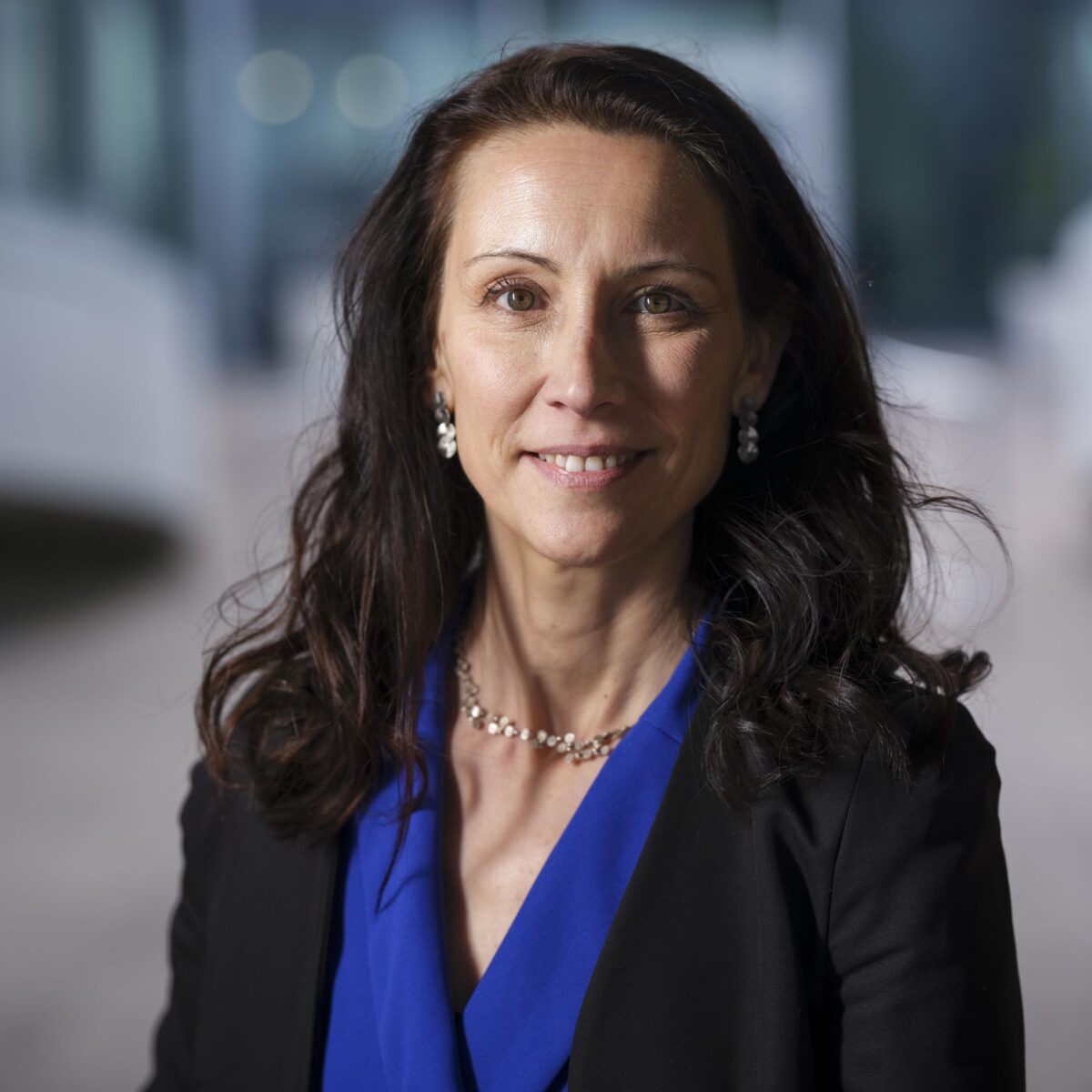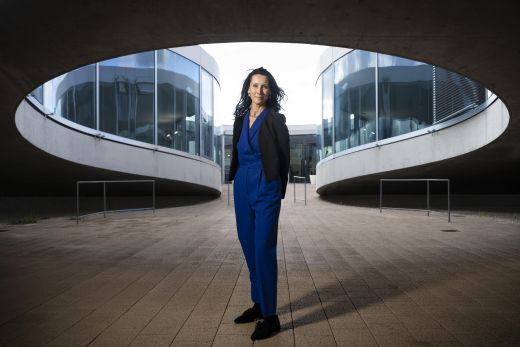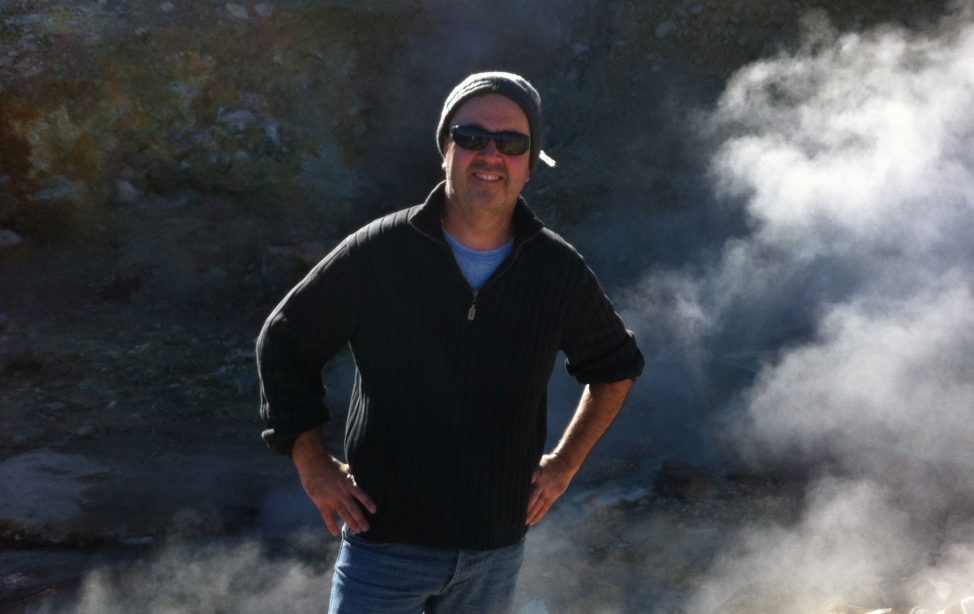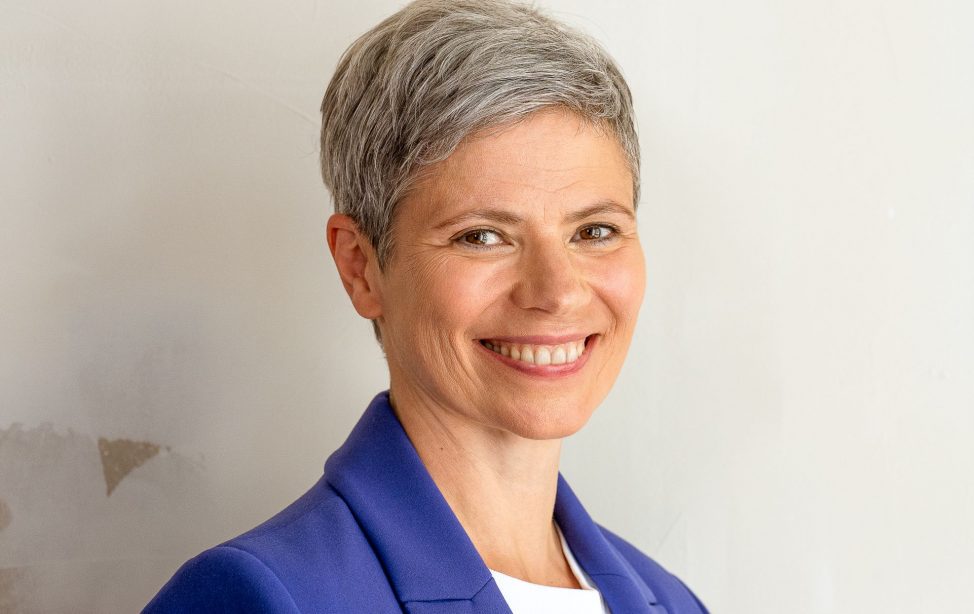
TUM Alumna Anna Fontcuberta i Morral has been president of EPFL since 2025 (Photo: Nicolas Righetti/EPFL).
And now, she is president of the university. Her packed schedule means the interview took place on Zoom. Anna Fontcuberta i Morral is sitting in her office, against a virtual background depicting the campus with breathtaking views over Lake Geneva and the mountains, modern buildings, and plenty of green. “That’s where students like to get some sun at lunchtime,” she says, leaning forward to give a better view of the futuristic building with its undulating concrete roof. “This is the Rolex Learning Center, where also our library is located.”
EPFL and TUM are both “technical universities,” which evolved from nineteenth-century engineering institutes. In 1969 the École Polytechnique de l’Université de Lausanne, attached to Canton de Vaud, became Switzerland’s second federal institute of technology. “Both TUM and EPFL are located in regions with a strong track record of research and innovation,” says Anna Fontcuberta i Morral, adding that both are notable for their high-caliber students. But what about the differences? “We’re a comparatively small institution, more like a start-up. Very agile.” While EPFL has around 14,000 students, TUM has four times as many. Both institutions are linked as members of the EuroTech Universities Alliance and the European EuroTeQ Campus; they operate exchange programs for students and hold joint courses in mechanical engineering and applied mathematics.
Speaking with focus and lucidity, the president outlines her clear-cut vision of what she aims to achieve during her term of office. First and foremost, she needs to make savings because the government in Bern has reduced the university’s budget in line with the debt constraints set out in the constitution. “We have to do more with less, so we are aiming to streamline our efficiency.” EPFL still has reserves in hand for this and next year. Anna Fontcuberta i Morral and her management team plan to make the most of this time to select which tasks to prioritize and which to shelve. To achieve this, she is relying on the community spirit that reigns at EPFL: “That’s our strength as a relatively small university.” Other plans for closing the budget deficit involve boosting private donations and founding partnerships with companies.
The president is passionate about fostering interdisciplinary collaboration. Two years ago, while still representing EPFL’s research centers, she launched an interdisciplinary seed fund. “We aim to build stronger collaborations in vital cross-sectional areas such as AI, medical technology, sustainability, and energy transition,” she explains, adding that EPFL is seeking to enhance its impact on society by leveraging innovations and driving knowledge and technology transfer. A new position of Vice President Innovation and Impact has been created for that purpose.
In Anna Fontcuberta i Morral’s view, solidarity with society is vital. “We have to prevent polarization in public opinion,” warns the physicist. “Populist movements are making their presence felt in Europe, too, often accompanied by skepticism over science. Perhaps we have neglected to listen to people closely enough in the past and forgotten that narratives are needed.” She believes that science must now become more approachable and must constantly explain that scientists are working on a greater mission: to improve people’s lives.
With this in mind, the EPFL governing board is ensuring that its professors show engagement. “ Any colleagues we promote need to be excellent in at least two out of the three areas of research, teaching, and transfer or impact.” Candidates are interviewed and assessed based on their performance in all three areas. Fontcuberta i Morral gives an example: “We have just sent out an offer to a young researcher whose research is naturally outstanding, but who ultimately won us over with his public engagement.”
Anna Fontcuberta i Morral did not set out to be a physicist. At school, she was equally at home in all subjects. But one day, she recalls, she realized there was one great advantage to mathematics: There is no need to learn anything by rote. All it takes is an understanding of the interrelations. From then on, she embraced mathematics, and later developed a love of physics as well. “I wanted to understand how the world works.” She certainly proved successful, winning numerous awards including a Marie Curie Excellence Grant and an ERC Starting Grant from the European Research Council (ERC). In 2013 she was appointed to TUM’s newly introduced honorary role of TUM Ambassador, a title now awarded annually to internationally outstanding scientists.
The office of president likewise initially formed no part of her plans for the future. However, alongside pursuing her research, she had always been actively involved in EPFL. “After expressing criticism of an organizational issue, I was asked whether I wanted to take over EPFL’s research centers.” Aware that accepting responsibility is a key part of making change, Anna Fontcuberta i Morral later began to consider applying for the office of President.
However, she had no intention of stepping away from research entirely: “My two predecessors ran small research groups, so I decided that could work for me, too,” she says. “Working with postgrad students is so fulfilling, so I set aside two half-days a week for them.”
In keeping with Anna Fontcuberta i Morral’s firm conviction that an excellent university needs a wide variety of talents, EPFL is actively involved in school activities, such as coding courses for girls. The institution is also on the lookout for outstanding women for new professorships. The approach is now paying off: “Based on the number of ERC Grants, our researchers here are more successful than elsewhere in Switzerland.” When Fontcuberta i Morral joined EPFL in 2008, the number of women professors only just reached double figures; now, 91 out of a total of 370 are women. The culture has changed, she points out: “Diversity works in an organization if it has the support of the leadership. Women leaders go where they are genuinely welcome.”
When asked how she balances her career with family life, the president responded with a slightly impatient retort: Why is that question only ever directed at women? She then answers that she has always worked hard and her family is used to it. Her husband is also a professor and is likewise constantly busy. “But when I spend time with the family, I’m one hundred percent there for them. We do activities together; we make sure we have great experiences together.” She runs regularly and practices yoga: “It’s important for my mind as well as my body.”
Anna Fontcuberta i Morral’s career is certainly an inspiration for many young researchers. She thinks back fondly to her own mentor – her supervisor at the California Institute of Technology (CalTech), where she did postdoc work. “He changed my life, particularly in my approach to research and to managing my teams.” She describes him as one of the best researchers she knows, who nevertheless always remains accessible: “He showed me how to be an excellent researcher without ever losing the human touch.”
But when Anna Fontcuberta i Morral now thinks of CalTech and other top US universities, she is concerned: “Science is ultra-international. We make progress because we discuss ideas and findings across borders.” She points out that as early as the era of Newton and Leibniz, scientists were corresponding and visiting each other in search of inspiration, and worries that the radical cuts imposed on research funding in the USA are damaging to science, not only in that country: “The whole world will suffer.” Her expectation is that the EPFL will take on more specialists from the USA in the future: “It’s good for us, but bad for research as a whole.”
At the end of our interview, we turn to the subject of Artificial Intelligence. “The AI revolution we are currently experiencing will slow its pace. When that happens, changes, including to our own research work, will become more clearly visible.” For example, she points out that ten years ago nobody would have imagined that an AI could predict the properties of new materials, as is customary today. “One day, AI will be viewed as a normal tool, just like a computer. The difference is that everything is happening so quickly. Because of that, we have to train our scientists and engineers differently in terms of methodology and ethics. Our aim is to send responsible leaders out into the world.”

TUM Alumna Anna Fontcuberta i Morral (Picture: Nicolas Righetti/EPFL).


